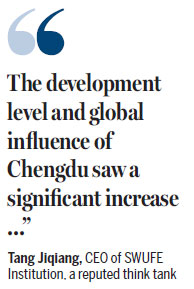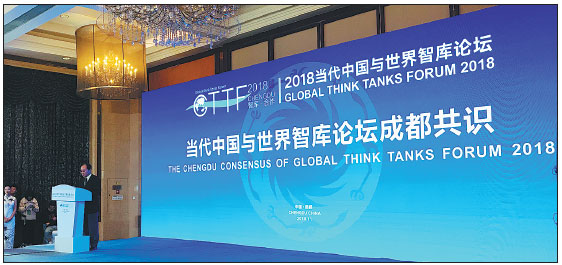Metropolis races to top of numerous worldwide influence rankings
As one of the most lively and outward-looking cities in China, Chengdu has been enrolled in the study lists of many global think tanks. It also tends to rank high on many of these lists.
For example, recently the city rose up on Beta+ as the 71st place among world cities as ranked by the Globalization and World Cities (GaWC) research network. Last year, it rose through four levels to Beta-, the highest growth speed worldwide.
"Chengdu shows how functional global mega-cities grow steadily. The economy and globalization of cities like Chengdu are now developing fast," said Ben Derudder, deputy director of GaWC, adding that the value of Chengdu is becoming more and more obvious.
Chengdu's connections to the wider world are becoming closer, as boosted by its expanding group of sister cities and the improvement of its infrastructure. It now has 34 international friendship cities and 111 international or regional airlines flying through the city's airport, as well as playing host to 17 diplomatic missions. It is also playing an increasingly important role in opening up to the West due to the Belt and Road Initiative.

This summer, the world's top think tank Brookings Institution released a monitoring report of global metropolises, in which Chengdu ranked third of 300 in terms of economic performance, following only Dublin in Ireland and San Jose in the United States. In July, the Standard Ranking City Institute released the first city rankings for the creative and cultural segment, in which Chengdu ranked first among 100 cities. In the report of best-performing Chinese cities put together by the Milken Institute, Chengdu also ranked first.
"The development level and global influence of Chengdu saw a significant increase, that's why it ranks high in many rankings, which in turn make think tanks' interest in the city grow," said Tang Jiqiang, CEO of SWUFE Institution, a reputed think tank.
According to Tang, the globalization of the city's industries promotes the globalization of its economy and the city as a whole. Additionally, the ecological, livable, cultural and fashionable elements are all parts of the city's ongoing development alongside the economy. Chengdu has become an example of high-quality development driven by a new philosophy among western Chinese cities. It provides new ideas for global governance.
The city is good at using the power of think tanks too, he said. In history, Chengdu was home to Zhuge Liang and Li Bing, ancient experts in governance. The decision-makers in Chengdu share the same characteristics, being able to predict future trends and make moves ahead of the curve.
In fact, Chengdu has taken advice from global think tanks on harnessing the spirit of inclusiveness and openness to boost its upgrade process.
In mid-November, the second annual meeting of the International Advisory Council was held in Chengdu. Sixteen advisors from multinational companies and overseas chambers of commerce came to the city to provide suggestions for its development. Since the council was first founded, many pieces of advice have been used in formulating the human resources and industries' policies, to help Chengdu prevail in city rankings.
The city is also cultivating professional think tanks. It established the Institution of New Economic Development to develop new economy and growth engines. It founded the country's first research institute focusing on construction of a garden city in May.
In addition to traditional colleges and academies, leading multinational companies can also play the role of think tanks, said Huang Renwei, executive vice-president of Fudan Institute of Belt and Road and Global Governance. It is with this backdrop that the number of Fortune Global 500 enterprises present in the city has already reached 285, more than any other central or western city.
"In the past, we said that Chengdu was a new first-tier city in China. Now it has become a new first-tier city in the world," said Huo Weidong, president of the Beijing Geely University, adding that the image of Chengdu as a city of innovation and entrepreneurship has won recognition from the public, and helped make it one of the most popular destinations for global talent.
The emerging industries of Chengdu are also unique, such as the aerospace and aviation, intelligent manufacturing and automobile industries. It also has strengths in games, animation, digital economy and cross-border e-commerce, Huo said.
Chengdu has become an important industrial base with frequent global exchanges. Its GDP reached 1.39 trillion yuan ($0.19 trillion) in 2017, ranking eighth among Chinese cities.
Chengdu has transformed from a regional central city to a national central city, and a global hub for westward and southward opening-up. It has also established a goal to build itself into a sustainable world city by 2050.
|
The Chengdu Consensus, released at the forum, states that extensive consultation, joint efforts and keeping up with the times are the fundamental approaches to global governance. |
(China Daily 11/30/2018 page24)















